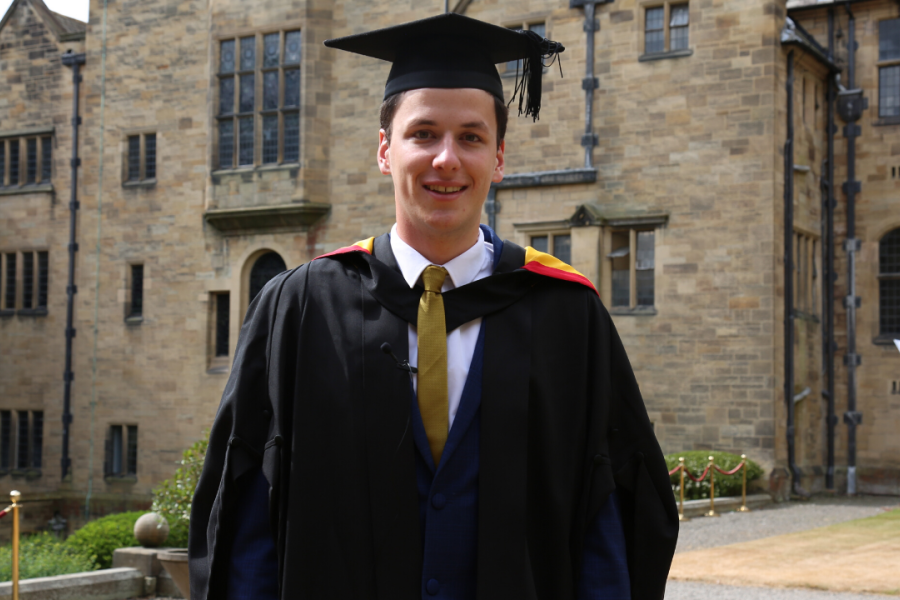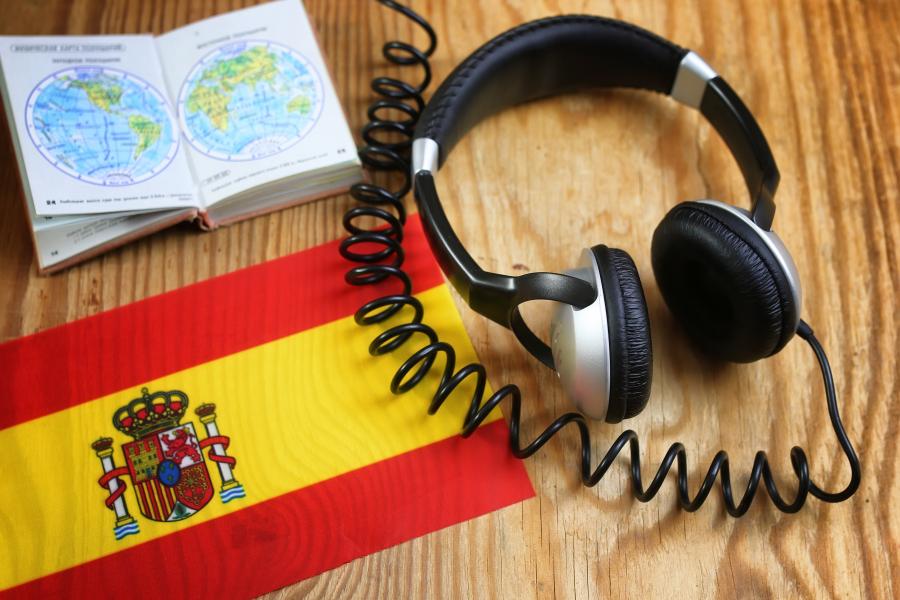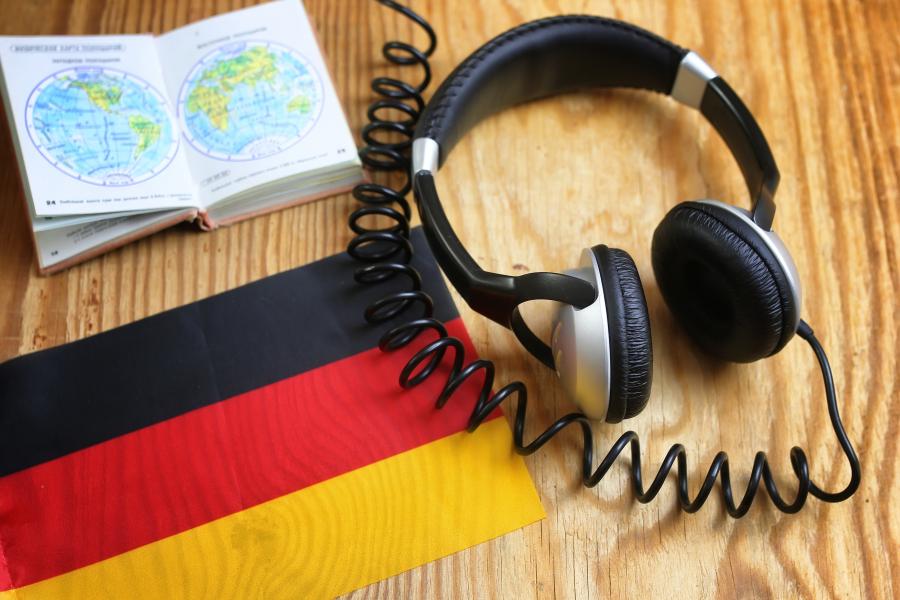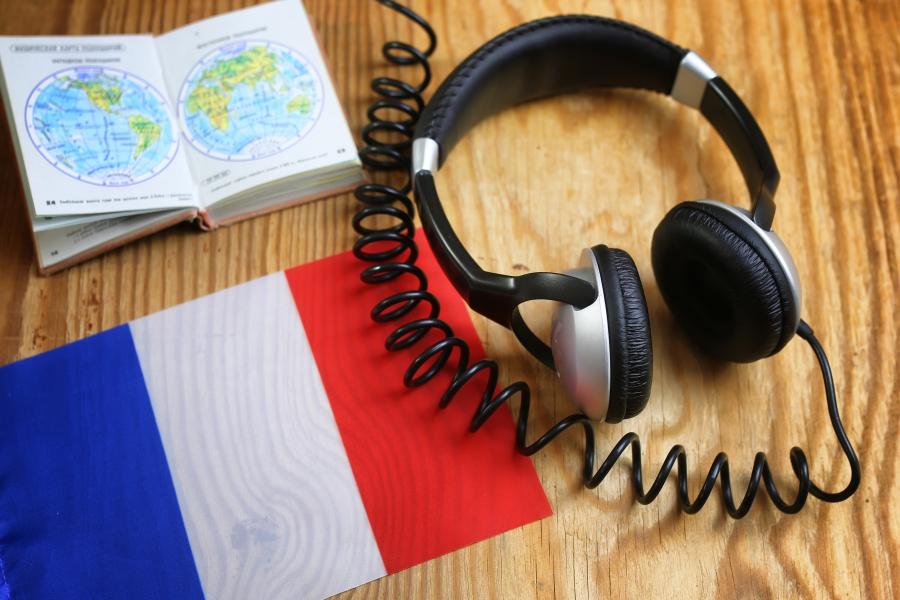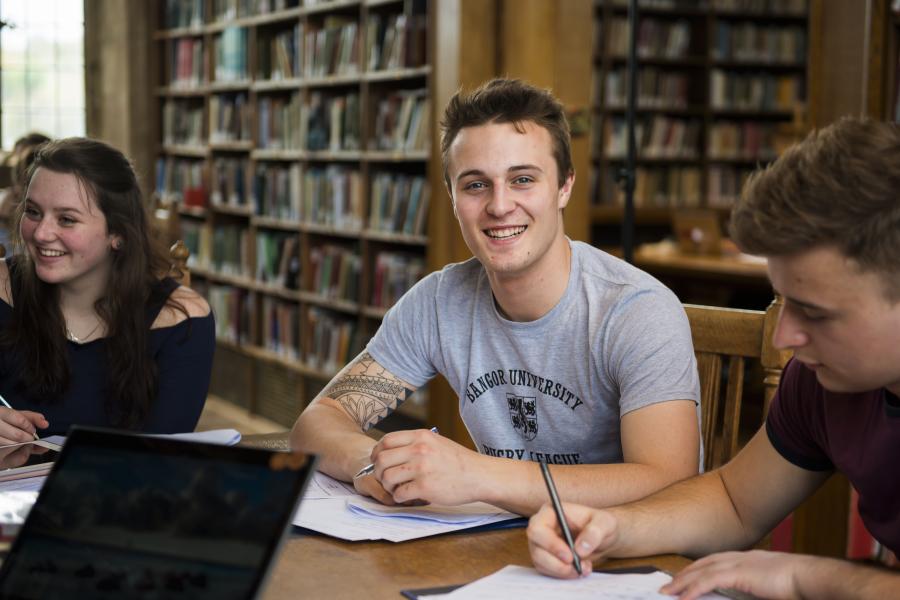About This Course
This degree provides an exciting opportunity to learn about languages, culture and history in a Welsh and international context. You can combine a Modern language (Chinese, French, German or Spanish, from beginners or advanced level) with the study of Welsh. Half your taught modules in each year will be in modern languages and half will be in Welsh. In Welsh, you will learn about diverse aspects of Welsh culture from a variety of different periods, while language modules will help you to thrive in a bilingual and multilingual environment.
All modern language modules include written skills (e.g. translation and essay writing) and oral skills taught by a native speaker.
Optional modules available in modern languages allow you to gain insight into the cinema, literature, history, and culture of the country whose language you are studying.
Within Cymraeg, you will have the opportunity to learn about aspects of Welsh culture and history that will complement what you will study in Modern Languages. This will include learning about how novels, poetry and other cultural forms have shaped the identity of Wales over a variety of different periods.
There are also extra-curricular activities that will both boost your subject knowledge and allow you to get to know your fellow students. These include cultural and social events organised by student-run societies in the academic departments. In addition, Pontio – Bangor University’s Arts and Innovation Centre – means that there will be a range of cultural events taking place only a short walk away from where many of your classes will be taking place.
Why choose Bangor University for this course?
- You will have opportunities to mix with fellow Welsh speakers in a county where the majority of the population speaks Welsh, and also practice your language skills with students who speak a wide variety of different languages.
- Chinese, French, German and Spanish are taught from Year 1.
- A world-renowned centre for the study of Welsh and Celtic Studies.
- The fantastic opportunity to broaden your horizons during a year abroad.
Additional Course Options
This course is available with a Placement Year option where you will study for 1 additional year. The Placement Year is undertaken at the end of the second year and students are away for the whole of the academic year.
The Placement Year provides you with a fantastic opportunity to broaden your horizons and develop valuable skills and contacts through working with a self-sourced organisation relevant to your degree subject. The minimum period in placement (at one or more locations) is seven calendar months; more usually you would spend 10-12 months with a placement provider. You would normally start sometime in the period June to September of your second year and finish between June and September the following year. Placements can be UK-based or overseas and you will work with staff to plan and finalise the placement arrangements.
You will be expected to find and arrange a suitable placement to complement your degree and will be fully supported throughout by a dedicated member of staff at your academic School and the University’s Careers and Employability Services.
You will have the opportunity to fully consider this option when you have started your course at Bangor and can make an application for a transfer onto this pathway at the appropriate time. Read more about the work experience opportunities that may be available to you or, if you have any questions, please get in touch.
This course is available with an International Experience Year option where you will study or work abroad for 1 additional year. You will have ‘with International Experience’ added to your degree title on graduating.
Studying abroad is a great opportunity to see a different way of life, learn about new cultures and broaden your horizons. With international experience of this kind, you’ll really improve your career prospects. There are a wide variety of destinations and partner universities to choose from. If you plan to study in a country where English is not spoken natively, there may be language courses available for you at Bangor and in your host university to improve your language skills.
You will have the opportunity to fully consider this option at any time during your degree at Bangor and make your application. If you have any questions in the meantime, please get in touch.
Read more about the International Experience Year programme and see the studying or working abroad options on the Student Exchanges section of our website.
Course Content
For the Modern Languages element, you will have 3-4 hours of language classes per week plus classes in your Modern Languages optional modules. Tuition is mainly in small groups and there are few formal lectures. Assessment involves coursework and written and oral examinations
Your classes for Cymraeg will include a mixture of lectures, seminars and tutorials. You will be assessed through examinations, essays, continuous coursework and oral presentations. You will also complete a dissertation as part of your degree, and you will normally have approximately 10-12 hours of classes per week.
Modules for the current academic year
Module listings are for guide purposes only and are subject to change. Find out what our students are currently studying on the Modern Languages and Cymraeg (Welsh) BA (Hons) Modules page.
Course content is for guidance purposes only and may be subject to change.
Facilities
Modern Languages facilities
- Language Centre where you can work on your language skills.
- Language-specific resource rooms where you can access materials to boost your language skills and cultural knowledge.
- Modern Languages DVD library featuring several hundred foreign language films that you can borrow for free.
- Dedicated study spaces.
- Film library.
- Dedicated Year Abroad support.
General University Facilities
Library and Archive Services
Our four libraries provide a range of attractive study environments including collaborative work areas, meeting rooms and silent study spaces.
We have an extensive collection of books and journals and many of the journals are available online in full-text format.
We house one of the largest university-based archives not only in Wales, but also the UK. Allied to the Archives is the Special Collections of rare printed books.
Learning Resources
There is a range of learning resources available, supported by experienced staff, to help you in your studies.
The University’s IT Services provides computing, media and reprographics facilities and services including:
- Over 1,150 computers for students, with some PC rooms open 24 hours a day
- Blackboard, a commercial Virtual Learning Environment, that makes learning materials available on-line.
Course Costs
General University Costs
Home (UK) students
- The cost of a full-time undergraduate course is £9,000 per year (2021/22 entry and 2022/23 entry).
- The fee for all placement, international, and sandwich years is £1,350 (2021/22 and 2022/23).
- More information on fees and finance for Home (UK) students.
International (including EU) students
Additional Costs
There are also some common additional costs that are likely to arise for students on all courses, for example:
- If you choose to study abroad or take the International Experience Year as part of your course.
- If you attend your Graduation Ceremony, there will be a cost for gown hire (£25-£75) and cost for additional guest tickets (c.£12 each).
Course-specific additional costs
Depending on the course you are studying, there may be additional course-specific costs that you will be required to meet. These fall into three categories:
- Mandatory Costs: these are related to a particular core or compulsory module that you’ll be required to complete to achieve your qualification e.g. compulsory field trips, uniforms for students on placement, DBS Check.
- Necessarily Incurred Costs: these may not be experienced by all students, and will vary depending on the course e.g. professional body membership, travel to placements, specialist software, personal safety equipment.
- Optional Costs: these depend on your choice of modules or activity and they are shown to give you an indication of the optional costs that may arise to make sure your choice is as informed as possible. These can include graduation events for your course, optional field trips, Welcome Week trips.
Entry Requirements
For all Modern Languages courses: Relevant modern language preferred. Our courses are designed to cater for those who have studied one or more languages as well as offering pathways for those beginning a language from scratch - there is no modern language language requirement for the beginner's language route.
Offers are tariff based, 96 - 128 tariff points from a Level 3 qualification* e.g.:
- A Levels: including grade B in Welsh (or a grade B in a humanities subject studies through the medium of Welsh - e.g. History, Geography, Religious Studies); Relevant modern language preferred (no language required for beginner's language route). General Studies and Key Skills not normally accepted.
- BTEC National Extended Diploma**: MMM - DDM
- Cambridge Technical Extended Diploma**: MMM- DDM
- City & Guilds Advanced Technical Extended Diploma (1080)**: considered on a case-by-case basis
- International Baccalaureate Diploma: including grade H5 in Welsh** and grade H5 in a relevant modern language (no language required for beginner's language route)
- Access**: pass required
- Welsh Baccalaureate**: We will accept this qualification in conjunction with other level 3 qualifications
- T Levels**: T Levels in a relevant subject considered on a case-by-case basis
- Extended Project Qualification: Points can include a relevant Extended Project (EPQ) but must include a minimum 2 full A-levels, or equivalent.
We are happy to accept combinations of the qualifications listed above, as well as alternative Level 3 qualifications such as City & Guilds, Access and Cambridge Technical Diplomas.
We also welcome applications from mature learners.
International Candidates: International Candidates: school leaving qualifications that are equivalent to A levels/Level 3 and/or college diplomas are accepted from countries worldwide (subject to minimum English Language requirements). More information can be found on our International pages.
*For a full list of accepted Level 3 qualifications, go to www.ucas.com.
**Can be considered in conjunction with another qualification in Welsh or taken through the medium of Welsh (e.g. A Levels).
For all Modern Languages courses: Relevant modern language preferred. Our courses are designed to cater for those who have studied one or more languages as well as offering pathways for those beginning a language from scratch - there is no modern language language requirement for the beginner's language route.
Offers are tariff based, 104 - 128 tariff points from a Level 3 qualification* e.g.:
- A Levels: including grade B in Welsh (or a grade B in a humanities subject studies through the medium of Welsh - e.g. History, Geography, Religious Studies); Relevant modern language preferred (no language required for beginner's language route). General Studies and Key Skills not normally accepted.
- BTEC National Extended Diploma**: DMM - DDM
- Cambridge Technical Extended Diploma**: DMM- DDM
- City & Guilds Advanced Technical Extended Diploma (1080)**: considered on a case-by-case basis
- International Baccalaureate Diploma: including grade H5 in Welsh** and grade H5 in a relevant modern language (no language required for beginner's language route)
- Access**: pass required
- Welsh Baccalaureate**: We will accept this qualification in conjunction with other level 3 qualifications
- T Levels**: T Levels in a relevant subject considered on a case-by-case basis
- Extended Project Qualification: Points can include a relevant Extended Project (EPQ) but must include a minimum 2 full A-levels, or equivalent.
We are happy to accept combinations of the qualifications listed above, as well as alternative Level 3 qualifications such as City & Guilds, Access and Cambridge Technical Diplomas.
We also welcome applications from mature learners.
International Candidates: International Candidates: school leaving qualifications that are equivalent to A levels/Level 3 and/or college diplomas are accepted from countries worldwide (subject to minimum English Language requirements). More information can be found on our International pages.
*For a full list of accepted Level 3 qualifications, go to www.ucas.com.
**Can be considered in conjunction with another qualification in Welsh or taken through the medium of Welsh (e.g. A Levels).
General University Requirements
To study for a degree, you’ll be asked for a minimum of UCAS Tariff points. For a fuller explanation of the UCAS Tariff Points, please see www.ucas.com.
We accept students with a wide range of qualifications and backgrounds and consider each application individually.
All students need to have good basic skills and the University also values IT and communication skills.
As part of the University’s policy, we consider applications from prospective disabled students on the same grounds as all other students.
We also consider applications from mature students who can demonstrate the motivation and commitment to study a university programme. Each year we enrol a significant number of mature students. For more information about studying as a mature student, see our Studying at Bangor section of the website.
EU and International Students' Entry Requirements
For detailed guidance on the entry requirements for EU and International Students, including the minimum English Language entry requirement, please visit the Entry Requirements by Country pages. International applicants can also visit the International Education Centre section of our website for further details.
Bangor University offers International Incorporated Bachelor Degrees for International students whose High School qualification is not equivalent to the UK school leaving qualification. The first year (or Year 0) is studied at Bangor University International College, an embedded College on our University campus and delivered by Oxford International Education Group.
Careers
Studying a course such as Modern Languages and Cymraeg provides you with a range of skills that are relevant to a wide variety of careers. Students with expertise in these fields often go into jobs in areas such as teaching, translating, civil service and local government. In addition, they also embark upon successful careers in the public sector, marketing, business, and media. In other words, you will gain a range of skills that are valued highly by employers from a wide variety of different sectors.
Opportunities at Bangor
The University’s Careers and Employability Service provides a wide range of resources to help you achieve your graduate ambitions.
The Bangor Employability Award (BEA)
The BEA is a comprehensive online course that you can work through at your own pace, taking you through all the steps you need to take to explore, prepare and apply for your dream career.
Internships
Bangor University runs a paid internship scheme within the university’s academic and service departments.
Student Volunteering
Volunteering widens your experience and improves your employability. Find out more about volunteering on the Students’ Union’s website.
Foundation Year
'With Foundation Year' options are available for this course. Apply for Modern Languages (with Foundation Year) or Welsh for Beginners.
What is a Foundation Year course?
If you don’t have the required qualifications for the degree-level course or are looking to re-enter education after time away from study, then a Foundation Year Programme might be the right choice for you.
The Foundation Year is an excellent introduction to studying this subject at university and will provide you with the knowledge, skills and confidence required to go on to study this course at degree-level.
When you have successfully completed the Foundation Year, you can progress on to the first year of this degree-level course.


